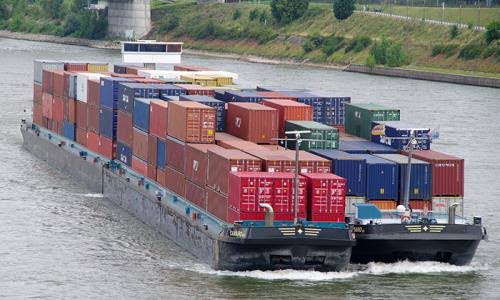Oluyinka Onigbinde
Barge operators operating in the nation’s maritime industry have lamented the delay in the commencement of commercial operations at the Lekki Deep Seaport, since it was commissioned.

The barge operators who decried low patronage in recent times stated that they are eagerly awaiting the commencement of commercial operations at the Lekki Deep Seaport two months after its inauguration by President Muhammadu Buhari, even as they express optimism that the commercial operations at the newest port will bring about change of fortune to them.
In a chat with our correspondent, a barge owner; Chibuike Otti, lamented that there has been a significant drop in barge operations in the country, while stating that they await the commencement of commercial operations at the Lekki deep seaport to serve as respite for them.
He said, “there is a significant drop in importation and this has really affected us, check the waters and see how many barges are operating, so whoever said that drop in importation has affected barge operators is not lying.
“For the Lekki deep seaport, we don’t know when commercial operations will begin, we are also eagerly waiting and I believe that as soon as commercial operations begin there, respite will come our way, we have had the minister said overtime that barge will be major mode of evacuation from that port and of course not all the barge operators will benefit, because there are specific barges that go to the high seas, but I want to believe many barge operators will benefit, so we eagerly await the commencement of commercial operations”
Also speaking in a chat with our correspondent, the Public Relations Officer of Barge Operators Association of Nigeria (BOAN); Daniel Eze said the association had met with the management of the deep seaport with the assurance that barging will be incorporated into its operations.
He said the delay in the commercial operations at the port does not mean barge operations will not take place at the port.
He explained that: “As a business person and barge operator we are working together with the terminals to see how we can utilize both services; that is the trucks and the barges. The terminals will not be termed efficient if the shipowners will not like their vessels to berth there and if the trucks are not enough to carry the containers
“It will affect the turnaround time. So I am sure the management is looking into it. Of course we cannot rule out the fact that barge operations will reduce the volume of containers that will discharge in that port and create space in their terminals for more containers to be offloaded and discharged and it is only by barge that it can be made possible.
“So we are trying our best. One truck can only take one container, but a barge can carry up to 30 or more. Once the operations start, we don’t expect that investors will rush into it. They will still have to work on their own side and fine-tune the operational aspect and logistics of it and also determine how viable that route is before implementation.
“It is a capital-intensive business and we don’t have to miss it. If we miss it, it will affect us. What I believe is that Lekki deep seaport will incorporate barges into their operations, that it is not happening now does not mean it will not happen tomorrow.
“All the barge operators who are interested in doing business at the Lekki deep seaport are doing their best in their strategies and calculations. I also believe that the Lekki deep seaport is also working on how to improve what is at Apapa and Tin can and I believe there won’t be any problem with that”, he said.
Speaking also with our correspondent, Engr. Emmanuel Ilori, the Vice President of the Association of Marine Engineers and Surveyors (AMES) urge the management of the deep seaport not to forget to develop the technical aspect of the business by building good network of inland waterways.
He explained: “Well, the development of the deep seaports can’t be total without the development of the inland waterway transport. A big seaport like Lekki will handle millions of tons of cargo and we can’t rely on the roads alone to support cargo evacuation.
“We have a God-given inland waterways network that covers 28 states of the nation. This is a huge potential that we should be developing. We should ensure that the waterways are navigable and proper barges are utilized.
“However, for the use of barges, I would advise that we don’t forget to develop the technical aspect of the business. We can take Rotterdam as an example. There is a good network of inland waterways. The big ships arrive and the cargoes are dispersed through smaller vessels and that is a multi-billion dollar business.
“China has also done something similar by taking their industries away from the land to coastal areas and developments, especially big industries, are spread along the waterways and riverine communities. This strategy also helps easy evacuation of products via the waterways. Nigeria needs to deploy the same strategy for its deep seaports and not just Lekki. However, we shouldn’t even have too many deep seaports because that will also pose new challenges.
“In Nigeria, we have most of the industries situated on the roads. We shouldn’t spend billions to develop roads and have trailers and tankers destroy these roads in a few years. The roads have become death traps with safety hazards but the waterways can drastically reduce this burden and accidents.
“One barge tanker could take about 100 road tankers off the roads. One container barge or river vessel could take 100 containers away from the roads and make operations safer. This should be the approach in Nigeria, not only for now but also for the future”.
Kindly like us on Facebook















